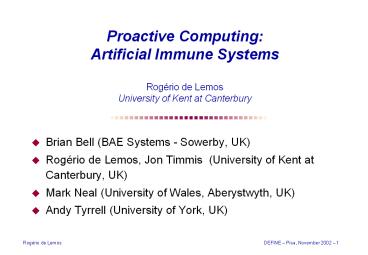Proactive Computing: Artificial Immune Systems Rog - PowerPoint PPT Presentation
Title:
Proactive Computing: Artificial Immune Systems Rog
Description:
Title: Architecting Dependable Systems R.de Lemos, C. Gacek, A. Romanovski Subject: staff development - web training Author: Rogerio de Lemos Keywords – PowerPoint PPT presentation
Number of Views:80
Avg rating:3.0/5.0
Title: Proactive Computing: Artificial Immune Systems Rog
1
Proactive Computing Artificial Immune Systems
Rogério de LemosUniversity of Kent at
Canterbury
- Brian Bell (BAE Systems - Sowerby, UK)
- Rogério de Lemos, Jon Timmis (University of Kent
at Canterbury, UK) - Mark Neal (University of Wales, Aberystwyth, UK)
- Andy Tyrrell (University of York, UK)
2
Biological Inspired Computing
- Autonomic computing (IBM)
- nervous system which regulates the basic
functions of the body - Planetary computing (HP)
- Self-healing systems (Software Engineering
Community) - Homeostasis (Mary Shaw)
- a system acts to maintain a stable internal
environment despite external variations - react to change rather than desired states
- Artificial immune systems
- fault-tolerance, intrusion virus detection
3
Motivation
- Provision of means for a system to cope with
changes - design time (evolution)
- building new systems from existing ones
- run time (adaptability)
- adapting to changes that occur in the operating
environment - Some approaches rely on learning
capabilities/emergent behaviours - adjust behaviour/structure to new needs without
human intervention
4
Artificial Immune Systems (AIS)
- AIS are adaptive systems inspired by theoretical
immunology and observed immune functions,
principles and models, which are applied to
complex problem domains - What does the immune system offer?
- pattern recognition
- robust and distributed
- adaptive and diverse
- learning and memory
5
Proactive Computing
- Fault tolerance
- Learning capabilities may enable the system to
react to unexpected circumstances - it removes the predictability aspect
- System evaluation
- how much can these learning capabilities be
trusted? - how to protect the system from undesirable
decisions?
6
Themes
- Artificial Immune Systems applied to Fault and
Intrusion Tolerance - e.g., evolution of error detectors
- Biologically Inspired Engineering
- embryonics, evolvable hardware, immunotronics,
etc. - Biologically Inspired Techniques for Autonomous
Dependable Systems - exploitation of homeostasis
- Swarm Techniques applied to Intrusion Tolerance
in Mobile Systems - coordination of countermeasures to attacks

